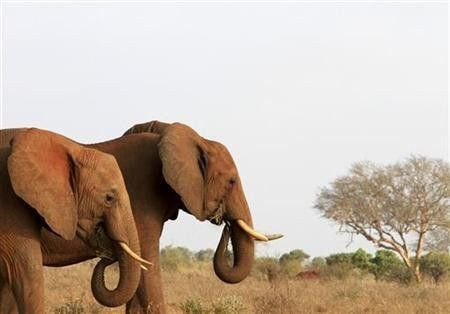China consumerism latest threat to Africa's elephants: report

China's fast-growing consumerism and lax policing of ivory laws are the latest threats to wild elephant populations, said an author of a recent report on endangered species.
Poaching of elephants and other species has increased in Central African countries, with products headed mainly to Asian markets and for the bush meat trade.
Esmond Martin and Lucy Vigne, authors of the report that was presented at a meeting of the Convention on International Trade in Endangered Species (CITES) in Geneva in mid-August, visited ivory carving factories and stores in southern China in January.
They compared the data with that which they had collated in previous visits going back to 1985.
Despite rigorous laws controlling the sale of ivory in China, the industry was booming and much of it appeared to be unregulated, they found.
Chinese authorities produced in 2004 a system where every piece of ivory must have an identification card ... What we found in southern China was that 63 percent of at least 6,500 ivory pieces being sold did not have the appropriate identification card and thus was illegal, Martin said at his home in Nairobi last week.
The imposition of controls over ivory sales won China CITES approval to buy and sell ivory from legal stocks and in 2008 China imported 62 tonnes of elephant ivory from CITES-approved auctions in South Africa, Botswana and Namibia.
But of 80 outlets that Martin and Vigne visited, only eight had compulsory ivory identification cards on display.
Perhaps two-thirds of all ivory being sold in southern China today is illegal because it doesn't have proper identification, said Martin, who monitors the sale of elephant ivory and rhino horn around the world.
CHINESE GETTING RICHER
Fuelling the illegal trade in ivory, according to Martin, is a growing demand from China's consumer class.
When I first went to China in 1985, 99 percent of the ivory being sold was being sold to foreigners. Now, by far the majority of the ivory being sold in southern China is being bought by Chinese because the Chinese like ivory and they are now wealthy enough to purchase it, he said.
Martin said he was concerned by the way unregulated demand in China has led to rising prices for ivory and fueled poaching of elephant herds in Africa.
Its about $750 a kilo now, compared with maybe $300-$400 a few years ago and this puts added pressure, added incentive by the poachers and traders in Africa to go after elephants.
It is not just elephants that are being killed.
People are being killed in the field trying to kill elephants, government officers are being killed as well by poachers, this trade is encouraging massive corruption in Africa and people are being bribed and removed in order to get the stuff out of the continent and over to China, Martin said.
A CITES report released in Geneva last week said the highest levels of elephant poaching since 2002 were recorded in 2010, with central Africa of most concern. CITES officials announced the creation of a $100 million fund to enhance law enforcement and secure the long-term survival of elephant populations.
As for China, it can be part of the solution, Martin said. If Chinese officials and traders can tighten their controls and law enforcement, they can reduce the illegal ivory trade in China.
© Copyright Thomson Reuters 2024. All rights reserved.





















